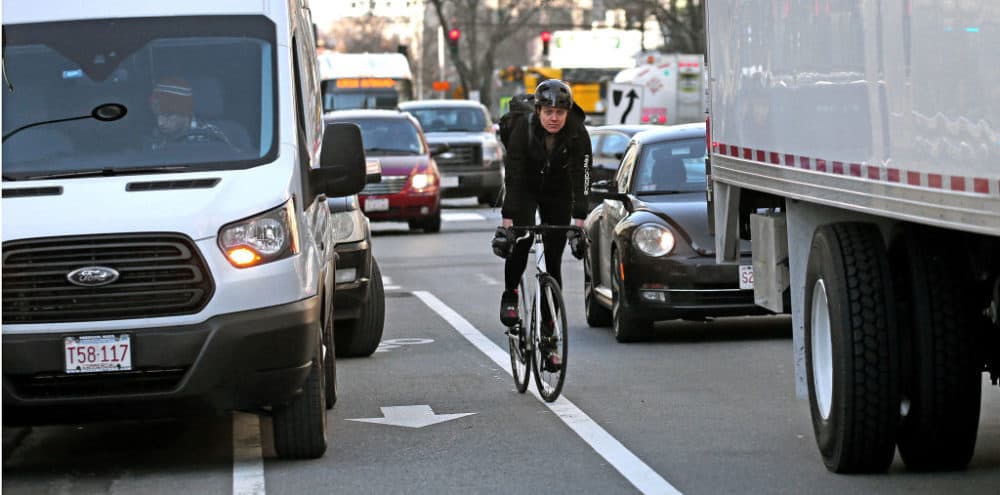Advertisement
Commentary
Mass. Is Going On A Greenhouse Gas Diet. So Should Every Other State In The Northeast

From hosting the first Thanksgiving to creating the country’s first public park, first public secondary school, and first university, Massachusetts has experience in setting the national pace. So it’s fitting that the Bay State is one of just three, plus Washington, D.C., making a New Year’s resolution to go on a greenhouse gas diet.
Inked also by Connecticut and Rhode Island shortly before 2020 expired, the Transportation and Climate Initiative (TCI) sets a gradually tightening cap on signatories’ motor vehicle emissions. Fuel suppliers will bid at auction for pollution rights under the cap, with states putting the proceeds — totaling an estimated $3 billion over the next decade for the four early adopters — toward cleaner transportation, direct and indirect: mass transit, e-vehicle incentives, walking and bike trails, and commute-cutters like more broadband.
If a Beacon Hill bill committing to net-zero emissions from all sources by 2050 is signed into law, the state that saw the first shots in the Revolution will fire a policy fusillade against climate change.
The TCI, based on a similar Northeast compact controlling power plant emissions, won’t kick in for another two years, until 2023. Eight other Northeastern states are dawdling on the deal, their concerns ranging from surmountable to stupid — New Hampshire Gov. Chris Sununu’s “boondoggle” charge winning blue ribbon for the latter. (Has Sununu similarly described the $649 billion that taxpayers shovel at fossil fuel companies?)
With 70% of Northeast residents supporting the TCI, leaders of the pokey eight, who pledge continued collaboration with the signatories, should put their money where their people’s mouths are, and start meaning it when they say: Climate change is an “existential threat!”
The Bay State is one of just three [states], plus Washington, D.C., making a New Year’s resolution to go on a greenhouse gas diet.
If that's so, we should be throwing everything we have at it. Yet the progressive governor of New Jersey, Phil Murphy, while endorsing the TCI “conceptually,” is pocketing his signing pen for now. “I’m conscious of the sticker shock,” he said, that could result from higher gas prices under the plan (an estimated five to nine cents a gallon).
Well, yes. Cleaner transportation requires making pollution, hence gasoline, more expensive, as a business consultant’s paper concedes (while opposing fuel taxes as burdensome for commerce). But there are better ways to cushion the hit on struggling families than frying the globe.
The TCI calls for member states to spend on affordable mass transit, an undertaking for which they’ve been promised a partner in the incoming Biden administration. Rural areas lack mass transit because they lack masses, but Vermont is one place where environmental groups and the government are test-driving alternatives like clean electric buses. How about helping such initiatives by diverting some of those aforementioned fossil fuel subsidies?
Listen to the science! is also common refrain. Science says cleaning up the way we move about is a must. “New England’s greenhouse gas emissions are dominated by transportation, heating of residential and commercial buildings, and electricity generation,” says physicist and Obama Department of Energy Secretary Ernest J. Moniz. A Union of Concerned Scientists blogger also applauds the TCI.
But like all purists who would prefer to live in a better reality, the pact’s critics undersell its strong points.
Our politicians should compromise! is another popular catchphrase. Some environmentalists grouse that the TCI doesn’t do enough for neighborhoods of color that are disproportionately polluted by cars (because, for example, they tend to abut highways). No doubt the pact is imperfect; great reforms always are, from abolition and the New Deal to environmentalism, which, at its modern rebirth in the early 1970s, hadn’t even heard of climate change. But like all purists who would prefer to live in a better reality, the pact’s critics undersell its strong points.
The 26% reduction in emissions the four signatories aim for is more than planners discussed just a year ago. If all the states participating in the TCI planning process signed up, they could prevent up to 1,000 deaths linked to poor air quality, according to a Harvard-led study.
A conservative Vermont opponent of TCI takes a cue from his governor that, while hiking costs at the pump make the deal a no-go for now, addressing climate change is “critical.” To which this opponent adds, “Yes, critical, absolutely, but …” Alas, that “but” rips away his fig leaf of concern over this “critical” problem. The Vermonter doesn’t bother suggesting better ideas for lowering the planetary thermostat. He merely damns the TCI as an “elaborately concealed carbon tax.”
Actually, economists, generally a conservative bunch, deem carbon taxes the best climate change policy. There are worthy, complementary moves. If rural people can’t avoid driving, for example, then Joe Biden’s likely revival of fuel efficiency standards would bury yet another of his predecessor’s bonehead moves.
New Year’s 2023 will bring even more advances against this existential threat, if Northeast residents demand that our leaders practice what we preach.
